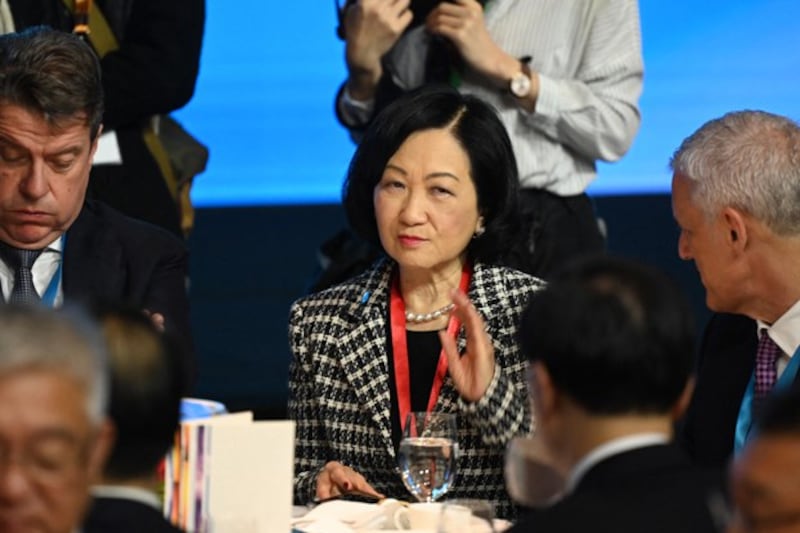Hong Kong's government on Friday tabled homegrown national security legislation it claims is needed to eradicate "undercurrents of dissent" in the city and extend an ongoing crackdown on public speech and political activism under a draconian law imposed in 2020 by Beijing.
Chief executive John Lee first flagged the controversial law – which sparked mass street protests and the earlier-than-expected retirement of then Chief Executive Tung Chee-hwa when it was first tabled in 2003 – in his October policy address, vowing "eradicate the causes" of dissent that he said still lingered in the city despite a 28-month-long crackdown on criticism of the authorities.
The "Bill on safeguarding national security implementing Article 23 of the Basic Law," was added to the Legislative Council's 2024 agenda on Friday, for consideration in either the first half or the second half of the year. Most tabled bills specify which half of the year they will be introduced in.
According to the agenda entry, the bill will also "complete and improve upon [existing] laws safeguarding national security, and make provisions for related matters."
The move comes amid a citywide crackdown in which more than 10,000 people have been arrested and at least 2,800 prosecuted in a citywide crackdown in the wake of the 2019 protest movement, mostly under public order charges.
At least 230 have been arrested under the National Security Law, which criminalizes public criticism of the Hong Kong and Chinese governments, as well as ties and funding arrangements with overseas organizations deemed hostile to China.
Executive Council convenor and former security chief Regina Ip, who presided over the failed attempt to introduce similar legislation in 2003, welcomed the move.
"Article 23 legislation is a constitutional responsibility under the Basic Law," she told journalists. "There have been many criticisms [of this legislation] from the West, but they are extremely biased."
"They have very strict national security regulations and are constantly revising them, so they are not qualified to criticize us," she said, promising that there would be plenty of time for lawmakers to scrutinize the bill.
'Patriotic' candidates only
The current Legislative Council was elected under record low turnout following a change in electoral rules that allowed only "patriotic" candidates with a strong track record of supporting the Chinese Communist Party to stand, and mounts no effective political opposition to government policy.
In his policy address, Lee quoted Beijing's top official in charge of Hong Kong, saying that "the root causes of chaos haven't yet been eliminated," warning that the authorities will remain on the lookout for "covert rebellions" and "soft resistance," vaguely defined concepts that will likely be used in the draft law.

Lawmaker Tik Chi-yuen said that while he doesn't oppose the bill, there are public concerns around it that should be listened to.
"There are still quite a number of Hong Kongers feeling worried about Article 23 legislation," he said. "Their worry is whether it would affect everyday freedoms or the room for social participation."
"Right now many citizens are still adjusting to the National Security Law,” he said, warning of "political turmoil" if the process is rushed.
Shih Wing-ching, chairperson of Hong Kong's Centaline Property Agency chain, said that while the Article 23 legislation was "inevitable," there are concerns over its impact on Hong Kong's reputation as a global financial center.
"It would have been better if they'd passed it back in the Tung Chee-hwa era, it would have been better than having China impose the National Security Law on Hong Kong," he told RFA Cantonese. "It would have been more applicable to Hong Kong."
"The approach Hong Kong takes towards national security affects its development ... the fact that they couldn't pass Article 23 legislation back then just turned it into a problem we as a society had to deal with later," he said.
Obsessed with national security
Pro-Beijing businessman Lew Mon-hung agreed, saying the addition of Article 23 legislation on top of the National Security Law makes the city appear obsessed with national security.
"If there is a National Security Law and Article 23 legislation as well, it will indeed make the international community think Hong Kong is totally obsessed with talking about national security in every area, and that it isn't respecting the differences between the two systems [its own and that of mainland China]," Lew said.
"Such narrowly leftist practices will only destroy Hong Kong," he said.
Eric Lai, research fellow at Georgetown Center for Asian Law, said global corporations would likely be affected by the new legislation.
"The recent conviction and lengthy jail sentence of a Japanese national on espionage charges shows how overseas companies in the mainland are vulnerable to national security imperatives," Lai wrote in a Jan. 6 commentary for the East Asia Forum website.
"The Hong Kong government’s commitment to incorporating anti-espionage offenses in the new bill may prompt foreign businesses to draw parallels with the mainland’s history of targeting foreign business groups," Lai wrote, adding that religious organizations could also be affected.
"Article 23 of the Basic Law does not clearly define offenses related to establishing ties between local political groups and foreign political organizations," Lai warned, adding that there is considerable room for government interpretation.
Translated with additional reporting by Luisetta Mudie . Edited by Roseanne Gerin.

